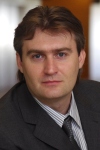Professor Andreev Furthers Our Understanding of Open Innovation
 At one time, firms could rely on the internal processes and the talent of individual employees to foster innovation. But that is no longer the case as openness and constant innovation have become the new benchmarks of high performance. Now scholars like Pavel Andreev are delving into the profound implications this trend has in the management sciences.
At one time, firms could rely on the internal processes and the talent of individual employees to foster innovation. But that is no longer the case as openness and constant innovation have become the new benchmarks of high performance. Now scholars like Pavel Andreev are delving into the profound implications this trend has in the management sciences.
“Innovation at its core is about knowledge, and the most valuable knowledge frequently lies outside an organization,” says Andreev, who recently became professor of business analytics and performance management after completing a post-doctoral fellowship at the Telfer School. “The global business environment demands that firms focus more on their networks with other organizations, competitors, suppliers, and clients, and on the processes linking these outsiders.”
“Performance management today does not depend exclusively on leveraging employee’ competencies in the context of internal projects. Rather, the focus has turned to the tools and strategies companies can use to deploy inter-organizational processes and make the most of networks of outsiders.”
New information technologies are behind this paradigm shift, enabling work teams to benefit efficiently from external knowledge and resources. “I’m interested not only in the technological changes that flow from that,” Andreev says, “but the structural and behavioural changes, in this relatively new domain of organizational performance analysis.”
Andreev’s projects cross several distinct disciplines and are international in scope. He conducts research on open code, open content and open commerce business models with colleagues at University College Cork, Ireland, a collaboration which dates from his time as a research fellow there, in 2009-2010. In the following year, Andreev examined the use and adoption of smart phones and the realization of mobile payments, as a postdoctoral scholar working with researchers at the Sagy Center for Internet Research at the University of Haifa, Israel; their collaboration is ongoing.
Professor Andreev is driven by an intense curiosity and a straightforward research philosophy. “By collaborating in interdisciplinary teams, involving those who work with new information technologies, we increase the relevance of the research.”

